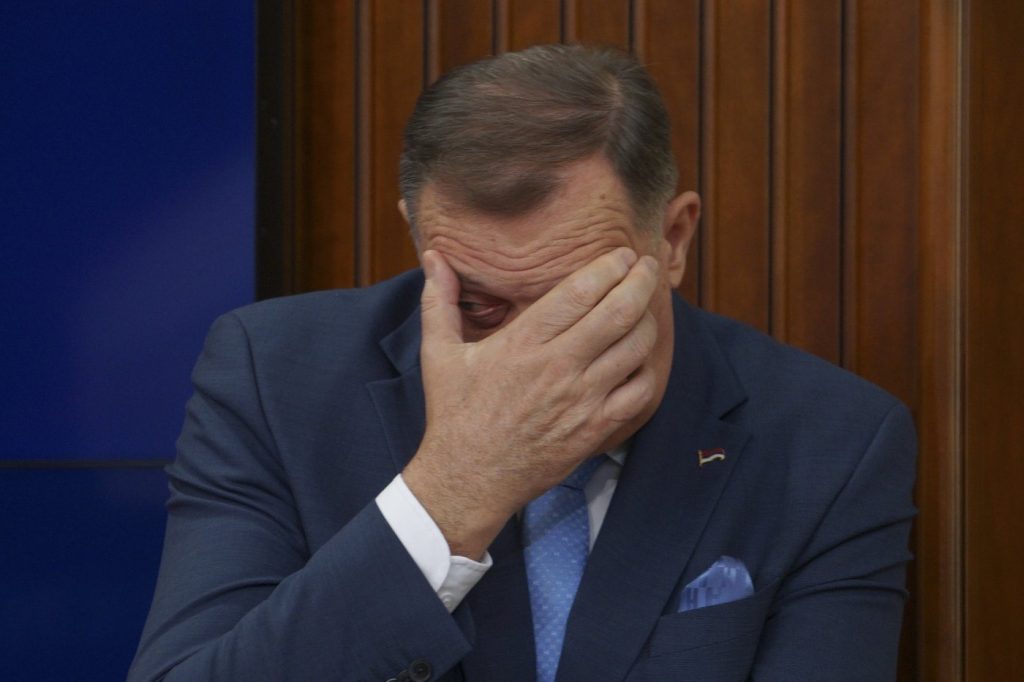SARAJEVO, Bosnia-Herzegovina (AP) – Bosnia's electoral authorities took a significant step on Wednesday by removing Milorad Dodik, the separatist Bosnian Serb leader, from his position as president of the Serb entity in Bosnia. This action followed a verdict from an appeals court that sentenced him to one year in prison and imposed a six-year ban on all political activities.
The Central Electoral Commission announced that Dodik has the right to appeal the decision, with an early presidential election expected to occur 90 days after the ruling. The last presidential election in the Bosnian Serb region took place in 2022.
Dodik's legal representatives plan to seek a temporary order to delay the implementation of the verdict and intend to appeal the case to the Constitutional Court of Bosnia-Herzegovina. The appeals court affirmed a previous ruling, confirming the pro-Russia leader’s sentencing and leading to the revocation of his mandate as Bosnian Serb president.
In response to the court’s decision, Dodik publicly rejected the ruling and asserted that he would continue to function as the president of the Bosnian Serb entity as long as he maintains the support of the Bosnian Serb parliament. He has garnered backing from Serbian President Aleksandar Vucic and Hungarian Prime Minister Viktor Orban, both of whom expressed their support for him.
The Bosnian Serb government has declared that it does not recognize the court ruling, labeling it “unconstitutional and politically motivated.” Nenad Stevandic, the speaker of the Bosnian Serb parliament, stated, “In any case, we can’t put him behind bars, that’s impossible. We can’t ban him from political activity. What he did till now, he will be doing from now on as well.”
The European Union emphasized last week that the verdict is binding and must be adhered to, highlighting that Bosnia is a candidate for EU membership and has been urged to strengthen its rule of law. Dodik's actions, characterized by separatism and pro-Russian sentiments, have stalled Bosnia's progress toward EU integration.
Throughout his political career, Dodik has frequently advocated for the separation of the Serb-dominated entity in Bosnia to join Serbia. His separatist rhetoric has led to sanctions from the former U.S. administration against him and his associates. Additionally, he has faced accusations of corruption linked to his pro-Russian policies.
Dodik’s threats of separatism have heightened tensions in Bosnia, a country that endured a devastating war from 1992 to 1995 sparked by the Serb rebellion against independence from the former Yugoslavia. This conflict resulted in approximately 100,000 deaths and millions displaced, as efforts to create a ministate for Serbs aimed at unification with Serbia unfolded.
The U.S.-sponsored Dayton Accords concluded the war, establishing two entities in Bosnia: Republika Srpska and the Bosniak-Croat Federation. These regions received significant autonomy but continue to operate under joint institutions, including the military, judiciary, and tax administration. Bosnia also has a rotating three-member presidency consisting of Bosniaks, Bosnian Serbs, and Bosnian Croats.
Throughout his tenure, Dodik has had ongoing conflicts with the international high representative overseeing peace in the region, Christian Schmidt, whom he has stated makes decisions that he deems illegal in Republika Srpska. The Dayton peace agreement permits the high representative to impose certain decisions and alter laws within Bosnia, contributing to ongoing tensions.











